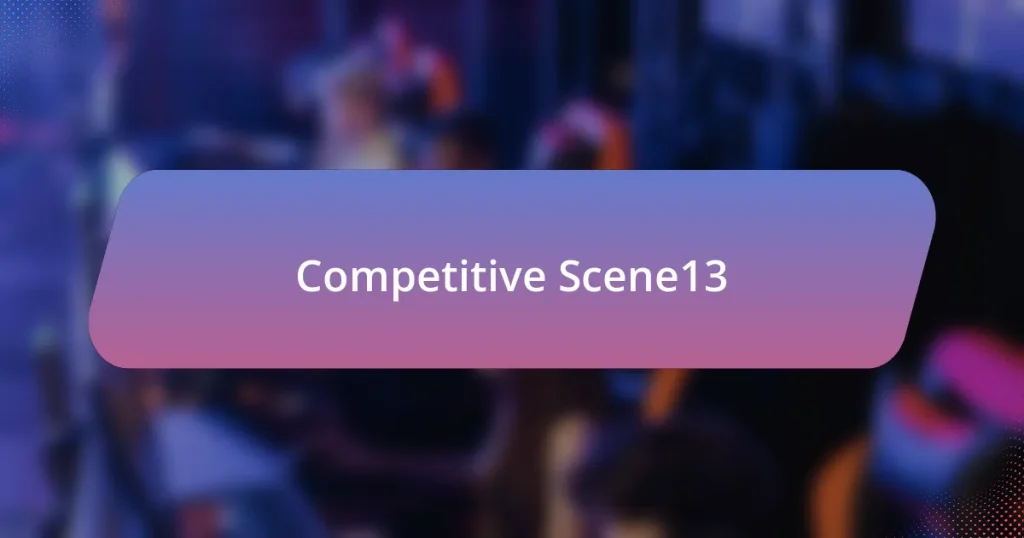The article focuses on the significance of mental health for Dota 2 professionals, emphasizing its direct influence on performance, decision-making, and overall well-being. It outlines the unique stressors faced by players, including intense competition, public scrutiny, and the pressure to maintain high performance, which can lead to anxiety and burnout. The article also discusses the impact of mental health on gameplay, signs of mental fatigue, and strategies for maintaining mental well-being, such as physical exercise and mindfulness practices. Additionally, it highlights the role of team organizations in providing mental health support and the importance of fostering a supportive environment within the esports community.

Why is Mental Health Important for Dota 2 Professionals?
Mental health is crucial for Dota 2 professionals because it directly impacts their performance, decision-making, and overall well-being. High-pressure environments, such as competitive gaming, can lead to stress, anxiety, and burnout, which negatively affect gameplay and team dynamics. Research indicates that mental health issues can impair cognitive functions, such as focus and reaction time, essential for success in Dota 2. Furthermore, maintaining good mental health fosters better communication and collaboration among team members, which is vital for achieving strategic objectives in matches.
What are the unique stressors faced by Dota 2 professionals?
Dota 2 professionals face unique stressors including intense competition, high public scrutiny, and the pressure to perform consistently at a high level. The competitive nature of esports requires players to constantly improve their skills and strategies, which can lead to burnout. Additionally, the visibility of their performances on streaming platforms and social media subjects them to criticism and feedback from fans and analysts, further amplifying stress. The financial implications of tournament results can also create anxiety, as players often rely on prize money and sponsorships for their livelihood. These factors contribute to a challenging mental health landscape for Dota 2 professionals.
How do competitive pressures impact mental well-being?
Competitive pressures significantly impact mental well-being by increasing stress, anxiety, and burnout among individuals. In high-stakes environments like professional gaming, such as Dota 2, players often face intense competition, leading to heightened performance expectations and fear of failure. Research indicates that 60% of esports athletes report experiencing anxiety related to competition, which can adversely affect their mental health and overall performance. Additionally, the constant pressure to perform can result in chronic stress, contributing to mental health issues like depression and decreased life satisfaction.
What role does public scrutiny play in mental health challenges?
Public scrutiny significantly exacerbates mental health challenges for Dota 2 professionals by increasing pressure and anxiety related to performance and public perception. The constant evaluation from fans, media, and peers can lead to heightened stress levels, which negatively impacts mental well-being. Research indicates that athletes and esports players often experience anxiety and depression due to the fear of judgment and failure, with a study published in the Journal of Sports Sciences highlighting that public pressure can lead to burnout and decreased performance. This scrutiny can create a toxic environment where mental health issues are not only prevalent but also stigmatized, making it difficult for individuals to seek help or express their struggles openly.
How does mental health affect performance in Dota 2?
Mental health significantly affects performance in Dota 2 by influencing players’ focus, decision-making, and emotional regulation. Players experiencing mental health issues, such as anxiety or depression, often struggle with concentration, leading to poor gameplay and mistakes. Research indicates that high-stress levels can impair cognitive functions, which are crucial for strategic thinking and quick reactions in competitive gaming. For instance, a study published in the Journal of Cyberpsychology, Behavior, and Social Networking found that mental well-being directly correlates with gaming performance, highlighting that players with better mental health tend to perform more consistently and effectively.
What are the signs of mental fatigue in professional players?
Signs of mental fatigue in professional players include decreased concentration, increased irritability, diminished motivation, and impaired decision-making. These symptoms manifest as players struggle to maintain focus during games, exhibit frustration over minor setbacks, show a lack of enthusiasm for practice or competition, and make poor strategic choices. Research indicates that mental fatigue can lead to a decline in performance, as evidenced by studies showing that cognitive overload negatively impacts reaction times and accuracy in gameplay.
How can mental health issues lead to decreased performance?
Mental health issues can lead to decreased performance by impairing cognitive functions, emotional regulation, and motivation. For instance, conditions such as anxiety and depression can hinder concentration, making it difficult for players to focus on strategies or react quickly during gameplay. Research indicates that individuals with mental health disorders often experience fatigue and reduced energy levels, which can further diminish their ability to perform at optimal levels. A study published in the Journal of Occupational Health Psychology found that employees with mental health issues reported a 35% decrease in productivity compared to their mentally healthy counterparts. This decline in performance can significantly impact Dota 2 professionals, where split-second decisions and teamwork are crucial for success.
What strategies can Dota 2 professionals use to maintain mental health?
Dota 2 professionals can maintain mental health by implementing strategies such as regular physical exercise, mindfulness practices, and structured breaks during gaming sessions. Regular physical exercise has been shown to reduce stress and anxiety, which is crucial for maintaining focus and performance in high-pressure environments like esports. Mindfulness practices, including meditation and deep-breathing exercises, help players manage stress and enhance emotional regulation, contributing to better decision-making during gameplay. Additionally, taking structured breaks allows players to recharge mentally, preventing burnout and promoting overall well-being. These strategies are supported by research indicating that physical activity and mindfulness can significantly improve mental health outcomes in competitive environments.
What are effective coping mechanisms for stress management?
Effective coping mechanisms for stress management include mindfulness practices, physical exercise, and social support. Mindfulness techniques, such as meditation and deep breathing, have been shown to reduce stress levels by promoting relaxation and enhancing emotional regulation. Research indicates that regular physical activity can lower stress hormones and improve mood, making it a vital component of stress management. Additionally, maintaining strong social connections provides emotional support, which is crucial for coping with stress. Studies have demonstrated that individuals with robust social networks experience lower levels of stress and better overall mental health.
How can players build a supportive team environment?
Players can build a supportive team environment by fostering open communication and trust among team members. Establishing regular check-ins allows players to express their feelings and concerns, which enhances emotional safety. Research indicates that teams with high levels of trust and communication experience better performance and lower stress levels, as highlighted in a study by the American Psychological Association, which found that supportive team dynamics significantly improve mental well-being and overall team effectiveness.

What resources are available for Dota 2 professionals to support mental health?
Dota 2 professionals can access various resources to support their mental health, including mental health hotlines, counseling services, and community support groups. Organizations like the Esports Mental Health Coalition provide resources tailored specifically for gamers, including access to licensed therapists who understand the unique pressures of competitive gaming. Additionally, platforms such as MindHealth provide online therapy and mental wellness resources specifically designed for esports athletes. These resources are crucial as they address the high levels of stress and anxiety often experienced in the competitive gaming environment, promoting overall mental well-being.
What types of mental health services are accessible to players?
Players have access to various mental health services, including counseling, therapy, and mental wellness programs. These services are often provided by organizations associated with esports teams or independent mental health professionals specializing in sports psychology. For instance, many professional teams have licensed psychologists or counselors on staff to support players’ mental well-being. Additionally, online platforms offer resources such as virtual therapy sessions and mental health workshops tailored for gamers. The increasing recognition of mental health’s importance in esports has led to more structured support systems, ensuring players can seek help when needed.
How can players find mental health professionals experienced in esports?
Players can find mental health professionals experienced in esports by utilizing specialized directories and platforms that focus on mental health services for gamers. Websites like the International Society for Sports Psychology and the Esports Mental Health Coalition provide listings of professionals who understand the unique pressures of competitive gaming. Additionally, players can seek recommendations from team organizations, as many esports teams now employ mental health specialists to support their athletes. Research indicates that mental health support tailored to esports can significantly enhance performance and well-being, highlighting the importance of connecting with qualified professionals in this field.
What role do team organizations play in providing mental health support?
Team organizations play a crucial role in providing mental health support by creating a structured environment that prioritizes the well-being of players. These organizations often implement mental health programs, offer access to professional counseling, and foster open communication about mental health issues. For instance, a study by the International Journal of Sports Science & Coaching highlights that teams with dedicated mental health resources report lower levels of stress and burnout among players. By integrating mental health support into their operational framework, team organizations not only enhance player performance but also contribute to a healthier competitive atmosphere in esports, particularly in high-pressure environments like Dota 2.
How can community initiatives promote mental health awareness in esports?
Community initiatives can promote mental health awareness in esports by organizing events that focus on mental well-being, providing resources for players, and fostering open discussions about mental health challenges. For instance, initiatives like mental health workshops and online support groups specifically tailored for esports athletes can create safe spaces for sharing experiences and coping strategies. Research indicates that community engagement significantly reduces stigma associated with mental health issues, as seen in studies highlighting the positive impact of peer support in competitive environments. By actively involving players and fans in these initiatives, the esports community can cultivate a culture that prioritizes mental health, ultimately benefiting the well-being of Dota 2 professionals and the broader gaming community.
What are some successful mental health campaigns in the gaming community?
Some successful mental health campaigns in the gaming community include the “Mental Health Awareness Month” initiatives by organizations like Take This, which focuses on reducing stigma and providing resources for gamers. Additionally, the “Gamers for Mental Health” campaign, which features various streamers and content creators discussing mental health openly, has gained traction, promoting awareness and support. These campaigns have effectively engaged the gaming community, evidenced by increased discussions around mental health on platforms like Twitch and social media, where mental health topics have seen a significant rise in visibility and support from both gamers and developers.
How can players contribute to a culture of mental health awareness?
Players can contribute to a culture of mental health awareness by openly discussing their own mental health experiences and advocating for mental health resources within the gaming community. By sharing personal stories, players can reduce stigma and encourage others to seek help, as evidenced by studies showing that public figures discussing mental health can significantly influence perceptions and behaviors in their communities. Additionally, players can collaborate with organizations focused on mental health, participate in awareness campaigns, and promote healthy practices, thereby fostering an environment where mental well-being is prioritized and supported.

What are the long-term implications of neglecting mental health in Dota 2?
Neglecting mental health in Dota 2 can lead to severe long-term implications, including burnout, decreased performance, and potential mental health disorders. Players who ignore their mental well-being may experience chronic stress, which can result in anxiety and depression, negatively impacting their gameplay and overall quality of life. Research indicates that high-stress environments, like competitive gaming, can exacerbate mental health issues, leading to a cycle of poor performance and increased psychological strain. Furthermore, the competitive nature of Dota 2 can create a toxic environment where neglecting mental health not only affects individual players but can also disrupt team dynamics, leading to conflicts and reduced team cohesion.
What are the potential career impacts of poor mental health?
Poor mental health can significantly hinder a Dota 2 professional’s career by affecting performance, decision-making, and overall job satisfaction. When mental health deteriorates, players may experience decreased focus, increased anxiety, and lower motivation, which can lead to poor gameplay and loss of competitive edge. Research indicates that 61% of esports professionals report mental health issues, which can result in burnout and high turnover rates within teams. Additionally, poor mental health can lead to strained relationships with teammates and coaches, further impacting team dynamics and performance outcomes.
How can mental health issues lead to early retirement from esports?
Mental health issues can lead to early retirement from esports by significantly impairing a player’s performance and overall well-being. The high-pressure environment of competitive gaming, particularly in titles like Dota 2, can exacerbate conditions such as anxiety, depression, and burnout. Research indicates that nearly 50% of professional gamers experience mental health challenges, which can result in decreased focus, motivation, and the ability to cope with stress. Consequently, these factors may compel players to retire prematurely to prioritize their mental health and seek recovery.
What are the risks of burnout for professional players?
The risks of burnout for professional players include decreased performance, mental health issues, and physical health deterioration. Professional players often face intense pressure to perform consistently at high levels, leading to chronic stress and fatigue. Studies indicate that approximately 35% of esports athletes experience symptoms of burnout, which can manifest as anxiety, depression, and a lack of motivation. Furthermore, burnout can result in prolonged absences from competition, negatively impacting career longevity and overall well-being.
What can be done to foster a healthier environment for Dota 2 professionals?
To foster a healthier environment for Dota 2 professionals, organizations should implement comprehensive mental health support programs. These programs can include access to mental health professionals, regular mental health check-ins, and workshops focused on stress management and resilience building. Research indicates that esports athletes experience high levels of stress and burnout, with a study published in the Journal of Sports Sciences highlighting that 70% of esports players report mental health issues related to their profession. By prioritizing mental health resources and creating a supportive culture, organizations can significantly improve the well-being and performance of Dota 2 professionals.
How can organizations implement mental health policies effectively?
Organizations can implement mental health policies effectively by establishing clear guidelines, providing training, and fostering a supportive culture. Clear guidelines ensure that all employees understand the mental health resources available to them, while training equips staff to recognize and address mental health issues. A supportive culture encourages open discussions about mental health, reducing stigma and promoting well-being. Research indicates that organizations with comprehensive mental health policies see a 30% reduction in absenteeism and a 25% increase in employee productivity, demonstrating the tangible benefits of such initiatives.
What best practices can players adopt for self-care and resilience?
Players can adopt several best practices for self-care and resilience, including establishing a balanced routine, engaging in regular physical activity, and practicing mindfulness techniques. A balanced routine helps players manage their time effectively, ensuring they allocate periods for practice, rest, and personal interests, which is crucial for mental well-being. Regular physical activity has been shown to reduce stress and improve mood, with studies indicating that exercise can enhance cognitive function and emotional resilience. Mindfulness techniques, such as meditation and deep-breathing exercises, have been proven to decrease anxiety and improve focus, allowing players to maintain composure during high-pressure situations. These practices collectively contribute to better mental health and performance in competitive environments like Dota 2.
What practical tips can Dota 2 professionals follow to enhance their mental health?
Dota 2 professionals can enhance their mental health by implementing structured routines, engaging in regular physical exercise, and practicing mindfulness techniques. Structured routines help create a sense of stability and predictability, which can reduce anxiety. Regular physical exercise has been shown to release endorphins, improving mood and reducing stress levels. Mindfulness techniques, such as meditation or deep-breathing exercises, can help players manage stress and maintain focus during high-pressure situations. Research indicates that athletes who incorporate these practices report lower levels of anxiety and improved overall well-being, highlighting their effectiveness in enhancing mental health.













